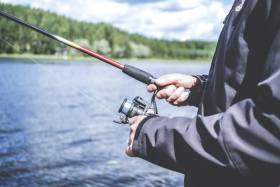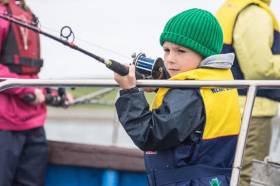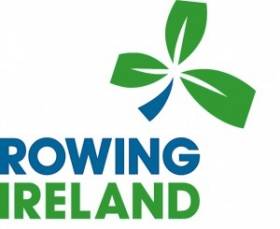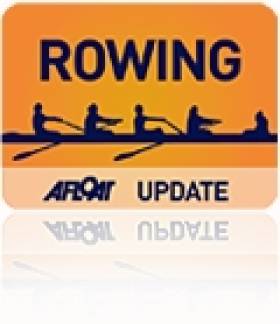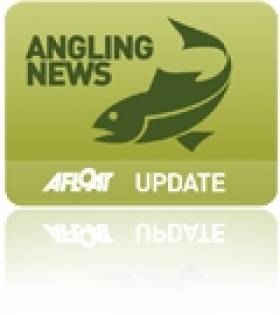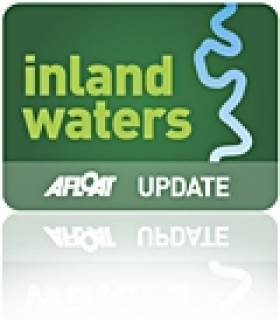Displaying items by tag: sponsorship
Brittany Ferries Sponsor Pamela Lee in Upcoming Transatlantic Race
World-record-holding Irish off-shore sailor, Pamela Lee, was in Cork Harbour recently, ahead of her next Transatlantic adventure, the 30th annual ‘Transat Jacques Vabre’ race, taking place from October 29th.
Pamela was attending the annual France-Ireland Chamber event, hosted by Brittany Ferries on board its flagship cruiseferry Pont-Aven, on a routine recent call to Ringaskiddy, Cork Harbour. (See first winter service on the Roscoff route) which Afloat adds will see Armorique’s mid-week crossings end for this season, as the cruise-ferry takes over the flagship’s weekend sailings extended from next month.
As guest of honour, Pamela was welcomed by Brittany Ferries president Jean-Marc Roué and chief executive Christophe Mathieu, as well as members of respective chambers on both sides of the Irish Sea.
Brittany Ferries used the occasion to confirm its sponsorship of Pamela and her sailing partner, French native Tiphaine Ragueneau. The company joins another Ireland-France ferry operator, DFDS as Afloat previously reported along with French energy provider Engie as joint-sponsors of the Franco-Irish, all-female crew
The Transat Jacques Vabre race is a major event on the international sailing calendar and retraces the historic coffee route from Le Havre in France to Fort-de-France Bay in the Caribbean. More than 60 craft will take part this year.
Pamela and Tiphaine will be one of just three all-female competitive teams.
At the event, Christophe Mathieu, CEO of Brittany Ferries stated, “As proud connectors of Ireland and France and strong supporters of the seafaring community globally we didn’t hesitate when approached to sponsor Pamela and Tiphaine on their forthcoming challenge. They are both incredibly determined and passionate about sailing, as well as increasing female participation in professional and amateur sport and offshore sailing. This dynamic duo represent the very best of partnership, endeavour and respect for seafarers and the seafaring community. That’s why we are so proud to sponsor them as they embark on this very impressive journey.”
In March this year, the Irish-French duo won the Cap pour Elles selection to take part in the Transat Jacques Vabre race, ahead of nine other pairs of young women. Cap pour Elles is an initiative designed as an opportunity to support up-and-coming female talent giving them the best chance to compete in this famous Transatlantic race.
A native of Greystones in county Wicklow, Pamela broke three world records as she sailed around Ireland in under four days in 2020.
For more information on Pamela Lee, please visit her website here.
Australia’s SailGP Team Driver Opens Up About Sponsorship Struggles
The driver and CEO of the Australia SailGP Team has opened up about his failure to secure any major sponsorship deals and claimed the two-time defending champions could be “on the chopping block” in the future.
Speaking on Shirley Robertson’s Sailing Podcast, Tom Slingsby reflected on the league’s decision to drop Season 2 runner-up Japan from Season 3 after the team failed to receive any financial backing.
Looking back at the beginning of SailGP, Slingsby said: “The orders from Russell [Coutts, SailGP CEO] was that at the end of the first five years, you’ve got to be commercially sustainable — we had targets.”
However, SailGP has “progressed a lot quicker than we expected”, he said, resulting in a glut of perspective, commercially independent teams approaching the league. "SailGP can’t build boats fast enough,” he said.
“I know the rules, Nathan [Outteridge, former Japan driver] knew the rules - we all do,” he said. “We’re all under pressure […] Nathan unfortunately was the first one to succumb to that pressure.”
 Australia SailGP Team celebrate in Chicago in the summer of 2022 | Credit: SailGP
Australia SailGP Team celebrate in Chicago in the summer of 2022 | Credit: SailGP
Slingsby opened up about his own struggles to secure financial backing for the Australian team, describing it as a “tough” task.
On the water, the Australia SailGP Team is dominating Season 3, sitting top of the overall championship leaderboard with 60 points and securing five podium finishes so far.
But in-between SailGP events, Slingsby’s “full-time role” is to secure sponsorship. “I can’t tell you how many thousands of hours I’ve spent trying to get sponsorship and I haven’t been able to do it yet,” he said, adding that his efforts have resulted in “some small sponsors” but “nothing major”.
“It’s extra frustrating because we’re getting such good results on the water and you wonder who wouldn’t want to be associated with the team that’s never had any scandals, never had any bad press — we go out there, we represent our country with honour, we’re good people, we’ve got great personalities on the team — why can’t we get sponsors?”
Despite the team’s on-water success, the Australia SailGP Team is not immune from being cut from the league, Slingsby said.
 Australia SailGP Team racing close with the Great Britain entry | Credit: SailGP
Australia SailGP Team racing close with the Great Britain entry | Credit: SailGP
He added that the team has been “saved” for “the time being” by the New South Wales government signing on as the official host venue partner of the Australia Sail Grand Prix in a three-season deal.
“Fortunately for us, Russell [Coutts] is viewing the Australian event and team as one, and the money that comes in as total, not separate,” Slingsby said.
Despite having the “luxury” of the three-season agreement, Slingsby said he by no means thinks he’s safe.
“We need to get some owners to buy the team or bring in some serious sponsorship dollars or 100% we’re on the chopping block,” he said.
However, he is optimistic about the future of the team: “We’ve got a lot of talks going on and a lot of great discussions with some companies — we just need some to drop and the future of the Australia SailGP Team will be sealed.”
Australia and the rest of the SailGP fleet are arriving in Singapore ahead of the eighth stage of Season 3 this weekend.
73 Angling Initiatives Nationwide To Receive Funding
#Angling - Inland Fisheries Ireland yesterday (Thursday 21 June) announced the beneficiaries of its 2018 Sponsorship Programme, which supports angling events and initiatives across the country.
The scheme will financially support 63 events to be held in Ireland, and a further 10 juvenile and women’s events to be held overseas, to the overall tune of €30,000 — with a focus on those which help grow Ireland’s angling tourism product and support novice anglers.
A number of other events around the country will receive assistance from IFI staff during the year, along with promotional support and the use of IFI biosecurity equipment to prevent the spread of invasive species.
This year, Inland Fisheries Ireland’s Sponsorship Programme will support:
- 19 international angling events which will be held in Ireland.
- 10 Irish angling teams travelling overseas to international angling events.
- 28 coaching/juvenile events/competitions aimed at novice and young anglers.
- 14 national and local angling events held in Ireland for domestic participants.
- 2 seminars which will help the exchange of information, ideas and practical experiences on fisheries management.
The angling initiatives, spanning 22 counties, will be supported through financial aid and, where possible, through resource support from Inland Fisheries Ireland staff members.
This year’s IFI Sponsorship Programme was announced in January with applications invited from anglers, angling clubs and organisations nationwide. In total, there were over 100 applications to the 2018 programme.
IFI’s head of business development Suzanne Campion said: “With Ireland having some of the best wild fisheries in Europe, this annual Sponsorship Programme forms part of our National Strategy for Angling Development, which aims to develop our angling tourism potential, while also managing and conserving our fisheries resource.
“Tourism initiatives like the Wild Atlantic Way and Ireland’s Ancient East are further boosting visitor numbers and our Sponsorship Programme for 2018 will support angling clubs and groups nationwide to offer local events which engage domestic anglers, overseas anglers and those who are about to cast for the first time.”
Recreational angling is estimated to contribute over €800 million to Ireland’s economy on an annual basis, supporting upwards of 11,000 jobs.
According to IFI, angling offers rural communities the opportunity to increase the number of visitors to the area and, in turn, support local business and create jobs by providing a sustainable source of income for both catering and accommodation services.
IFI 2018 Sponsorship Programme Beneficiaries List
Cavan
- Cootehill IFI Fishing Festival: five-day coarse fishing festival at Cootehill, organised by Cootehill Fishing Festival.
- Arvagh Breffni Seniors event: angling competition at Arvagh lakes over five days, organised by Arvagh Angling Holidays
- Arvagh International Coarse Fishing Festival: angling competition at Arvagh lakes, organised by Arvagh Angling Holidays.
- Arvagh King of Clubs: angling competition at Arvagh lakes, organised by Arvagh Angling Holidays.
- Arvagh Breffni Open: angling competition at Arvagh lakes, Arvagh Angling Holidays.
- Romanian Catch and Release Angling Association’s lure fishing competition at Lough Ramor, organised by the Romanian C&R Angling Association.
- Feeder fishing three-day event: Barnagrove Lake and Lough Sillan, organised by C/M Lakelands Feeder Club.
- Building Angling Tourism Potential in Leitrim & Cavan: workshop format event at Slieve Russell Hotel, Ballyconnell, organised by Upper Shannon Erne Future Economy Project.
Cavan/Leitrim - World Pairs Angling Championships: Shannon-Erne region, organised by World Pairs Angling.
- All Ireland Championships Senior & Ladies: Shannon Erne and various locations in counties Cavan and Leitrim, organised by the National Coarse Fishing Federation of Ireland, celebrating 60th anniversary.
Clare
- International Angling Week 2018: shore angling competition, Fanore, organised by Lisdoonvarna Fanore Sea Angling Club.
- Predator Battle Ireland: European angling competition, Lough Derg, Clare/Tipperary/Galway/Limerick, organised by Predator Battle Ireland.
- Trout Angling Competition: iuvenile angling competition, Lough Derg, Clare/Tipperary/Galway/Limerick, organised by Molamphy.
Cork
- Cork Small Boats Festival 2018: bring-your-own-boat sea angling festival, Cork Harbour area, organised by Cork Small Boats Festival Committee.
- SALC - Home Nations Boat (Seniors) 2018: boat sea-angling competition, Cobh, organised by Irish Federation of Sea Anglers.
- Defence Forces Sea Angling: boat competition, Crosshaven, organised by DFSAC.
- Tibbotstown Reservoir Initial Stocking: stocking of brown trout, reservoir, organised by Glanmire & District Salmon & Trout Anglers Association.
- Introduction to Game Angling Course: Tibbotstown Reservoir, Carrigtwohill, organised by Glanmire & District Salmon & Trout Anglers Association.
- Introduction to Angling: eight-week introductory course on angling, River Bride, Rathcormac, organised by Rathcormac Angling Hub.
- Fly-tying for beginners: eight-week fly-tying course, Rathcormac Community Centre, organised by Rathcormac Angling Hub.
- Introduction to Invertebrates and Entomology: three-week course, River Bride, Rathcormac, organised by Rathcormac Angling Hub.
Dublin
- Weekly Educational Workshops: on a weekly basis KAI hosts an hour-long workshop to help introduce youths to angling, Killinarden Community Centre, organised by Killinarden Angling Initiative (KAI).
- Monthly youth angling field trips: once a month (the last Saturday) KAI brings 20 youths on an angling trip to put into practice what they have been learning in the weekly workshops, various locations/counties (canals, lakes, rivers and beach), organised by Killinarden Angling Initiative.
Galway
- Police International Fly Fishing/Home Nations Competition: three-day trout fly fishing competition between the police forces of Ireland, Northern Ireland, England, Scotland and Wales, Lough Corrib, Green Fields Bay, organised by Garda Trout and Salmon Anglers Club.
Kerry
- Tag-a-Ray: a competition that encourages anglers to become involved in tagging and to increase awareness of conservation, Tralee Bay, organised by Tralee Bay SAC.
Kildare
- TAFI youth training day: training for TAFI youth anglers in Leinster, River Slate, organised by Rathangan Trout and Salmon Anglers Association.
Kilkenny
- Annual Junior Fishing Competition: fishing competition for Under-14s, The Nore, organised by Kilkenny City and County Anglers.
Leitrim
- Ballinamore Coarse Angling Festival: five-day coarse angling festival, Shannon-Erne, organised by Lakelands Angling Ballinamore.
- All-Ireland Championships Senior & Ladies, National Coarse Angling Championships - 60th Anniversary, Shannon-Erne, Cavan/Leitrim, organised by National Coarse Fishing Federation of Ireland.
Limerick
- Glin Shannon river fishing: shore fishing on estuary, lay-by beyond Glin Pier, organised by Glin Development Association
Shannon, Mulkear and District Anglers Association - Catch and Release Salmon Angling competition, ‘The Haunt’, Mulcair River, organised by William O'Halloran.
Mayo
- Spring International Fly Fishing Match: international fly fishing competition comprising of teams from Ireland, England, Scotland and Wales, Lough Mask, Cushlough Bay, Ballinrobe, organised by Irish Trout Fly Fishing Association (ITFFA).
- Newport SAC 52nd Annual Sea Angling Festival: combined shore and boat angling competition, open to all anglers, Clew Bay, Co Mayo, organised by Newport Sea Angling Club.
- Junior-branch shore angling training: teaching the younger members of the club the joys of shore angling, various shore-based locations around Clew Bay, organised by Newport Sea Angling Club.
- National Junior Competition (Daniel Peacock Memorial): 26th Anniversary of a Juniors-only sea angling competition, Clew Bay, organised by Newport Sea Angling Club.
- RBM Fisheries Petals Cup Ladies Sea Angling Competition: ladies’ sea angling competition from novice to experienced, Clew Bay, organised by RBM Fisheries.
Meath
- Boyne Valley Fishing Hub: angling for beginners, River Boyne, Trim, organised by Boyne Valley Hub.
- Summer Youth Programme: series of coaching evening sessions targeting local youth, Royal Canal at Enfield, organised by Royal Enfield Coarse Angling Club.
Monaghan
- Junior Summer Camp 2018: introducing Juniors to the basics of angling and fish care, Lisanisk Lake, organised by Carrickmacross Coarse Angling & Junior Development Club.
Offaly
- Edenderry Coarse Angling Six-Day Gala Week, Grand Canal, Edenderry area, Edenderry Coarse Angling Club.
- The Daingean teams-of-four angling festival: four-person teams event with the aim of bringing teams to the Grand Canal in Offaly from across the world, Grand Canal, organised by Daingean Angling Club.
- Junior Anglers 2018: seven-week coarse angling for under-18s, Grand Canal, Tullamore, organised by Tullamore and District Angling Club.
- Angling Awareness Competition, Grand Canal, organised by Belmont and District Fishing Club.
Roscommon
- Fishbook Open Fly Competition: first-ever meeting of members for an all charitable catch and release, fly only for trout completion, Lough Key, organised by Fishbook Ireland.
- Cuisle Angling Event, River Suck, Donamon, organised by Cuisle Holiday Centre.
- Building Angling Tourism Potential in Roscommon & Longford: workshop part of a series, Keenan’s Hotel, Termonbarry, organised by Upper Shannon Erne Future Economy Project.
Waterford
- Disability outreach programme at Ballyshunnock, organised by St Paul’s Fishing Club.
- Rinnashark Sea Angling Club Small Boats Angling Festival: small boats species hunt angling competition, at Dunmore East, organised by Rinnashark SAC.
- Junior League: six coaching and competition sessions, Ballyshunnock, River Barrow, Oaklands, organised by Waterford and District Coarse Angling Club.
Westmeath
- Introduction to coarse angling for juniors: includes tuition session in the basics of coarse angling for Juniors, venue tbc, organised by Navan Coarse Angling Club.
- Lough Ree International Pike Classic: three-day predator competition featuring 100 boats and 50 international and international competitors, Lough Ree - launching at Ballyleague & Lanesborough, organised by Lough Ree Angling Hub.
- Lanesborough International Coarse Fishing Championships: three-day international fishing competition with competitors from UK, rest of Europe and Ireland, three different locations - this year, the Royal Canal for first time, includes Roscommon and Longford fisheries, organised by Lough Ree Angling Hub.
- Lough Ree International Pike Festival and World Cup: three days of pike fishing on the fabulous Lough Ree with 100 boats taking part from Ireland, Germany, Austria, Belgium, England and Northern Ireland, organised by Lough Ree International Pike Festival and World Cup (Athlone Anglers Association).
- Junior All Ireland Pike Fishing Championships: series of under-18s Pike fishing competitions, organised by Leinster Pike Angling Club.
Wexford
- 33rd Annual Rosslare Small Boats Festival: small boat angling species hunt, Kilmore Quay, organised by Small Boat Anglers of the UK & Ireland.
- Irish Winter Shore Angling Festival: three-day shore angling competition, Kilmuckridge, organised by European Federation of Sea Anglers.
- Dunbrody Festival: two-day coarse angling festival, organised by Oaklands Coarse Angling Club.
Wicklow
- Novice Angler Introduction to Boat Angling: practical boat angling with introduction/coaching, Wicklow Port, organised by Wicklow Bay Sea Angling Club.
- Youth Boat Angling Coaching: introduction and coaching for youth in boat angling, Wicklow Port & Kilmore Quay, organised Leinster Provincial Council.
- Angling Coaching – Shore: introduction and coaching for youth, venue TBC, organised by Leinster Provincial Council.
#Angling - Inland Fisheries Ireland has launched its Sponsorship Fund for 2018 which will support angling events and initiatives across the country.
The fund supported 79 events and initiatives across 19 counties to the tune of €30,000 in 2017, with a particular focus on those which help grow Ireland’s angling tourism product and support novice anglers.
Recreational angling is estimated to have contributed over €800 million to Ireland’s economy in 2017, supporting upwards of 11,000 jobs.
Inland Fisheries Ireland’s Sponsorship Fund aims to support large international competitions held in Ireland which showcase Ireland’s angling offering and contribute to local economies.
The fund also contributes to novice angler events which increase participation in angling among those who want to begin, or who have recently taken up, fishing as a hobby.
Finally, it also helps initiatives which disseminate information that promote conservation and protection of the inland fisheries and sea angling resource and can include seminars, workshops and training.
Support from the Sponsorship Fund can be either financial or resource support from IFI staff members.
According to IFI, angling offers rural communities the opportunity to increase the number of visitors to the area and in turn, support local business and create jobs by providing a sustainable source of income for both catering and accommodation services.
Suzanne Campion, IFI head of business development, said last year’s Sponsorship Fund “supported 79 initiatives all over the country which had a focus on helping grow Ireland’s angling tourism product and supporting novice anglers.
“Tourism initiatives like the Wild Atlantic Way and Ireland’s Ancient East are further boosting visitor numbers and our Sponsorship Fund for 2018 will support angling clubs and groups nationwide to offer local events which engage domestic anglers, overseas anglers and those who are about to cast for the first time.
“With Ireland having some of the best wild fisheries in Europe, this Sponsorship Fund forms part of our National Strategy for Angling Development which aims to develop our angling tourism potential while also managing and conserving our fisheries resource.”
IFI’s National Strategy for Angling Development is the first comprehensive national framework which will deliver a wide-ranging set of investments, innovations and promotions over the coming five years.
It aims to make angling accessible and attractive through information, infrastructure and support, to develop tourism through the promotion of the angling resource and to position angling as a key leisure and recreation pursuit.
The strategy is intended to deliver significant economic benefits in rural communities where much of angling takes place, while also ensuring that fish populations and habitats are protected and conserved.
Applications for funding from the 2018 Sponsorship Fund are now invited from angling clubs, associations or any local group organising an angling initiative.
The scheme will remain open for applications until Monday 22 January and all applications can be made online. Awards will be subject to budget availability and adherence to the scheme requirements.
#Angling - A total of 79 angling initiatives — almost double the number of recipients in 2016 — will be supported to the tune of €30,000 in Inland Fisheries Ireland’s (IFI) 2017 Sponsorship Scheme.
This year’s recipients were decided with a focus on those which help grow Ireland’s angling tourism product and support novice anglers:
- 19 international angling events which will be held in Ireland.
- 15 Irish angling teams travelling overseas to international angling events.
- 28 coaching/juvenile events aimed at novice and young anglers.
- 16 national angling events held in Ireland for domestic participants.
- 1 seminar which will help the exchange of information, ideas and practical experiences on fisheries management.
The angling groups, located in 19 counties across the country, will be supported through financial aid and where possible, through resource support from IFI staff.
The sponsorship scheme was announced in December with applications invited from anglers, angling clubs and organisations nationwide. In total, there were over 100 applications to this year’s fund.
Suzanne Campion, IFI head of business development, said: “We have a unique opportunity in Ireland when it comes to angling as a result of our beautiful landscapes and wild fish populations. This is coupled with a large number of engaged angling groups across the country.
“We are committed to supporting those groups in helping to increase participation in angling and to position Ireland as a premier national and international angling destination. This will grow the recreational availability and contribution of angling to communities across Ireland and will also support businesses and jobs in rural communities.”
IFI’s National Strategy for Angling Development aims to increase overseas angling visits from 163,000 in 2015 to 173,000 and increase domestic participation of 273,000 anglers annually by 0.5%.
Angling in Ireland is currently worth €836 million to Ireland’s economy annually, supporting upwards of 11,000 jobs. If increase in participation is realised, angling could bring in an additional €53 million annually and support 18,000 jobs.
Find more more information on the initiatives awarded funding under the 2017 sponsorship scheme HERE.
Coillte to Sponsor Grand League Series
#Rowing: Coillte and Rowing Ireland have announced that Coillte will sponsor the Grand League regatta series. Coillte is a forestry management company which owns about seven per cent of the land cover of Ireland. It is also involved in renewable energy and panel products.
The first leg of this year’s Coillte Grand League series is Skibbereen Regatta which is set for this weekend at the National Rowing Centre in Cork. Around 700 crews and 2,000 athletes compete at Skibbereen Grand League Regatta every year, with a six-lane race running every four minutes over two days – if the unpredictable Irish weather permits. It is a mammoth event and takes up to 100 volunteers to run successfully each year.
Ciarán Fallon, Director of Stewardship and Public Goods at Coillte said: “Coillte is delighted to be supporting Rowing Ireland with this year’s Grand League series ahead of the Rio Olympics in August. Two of the three regattas in this year’s series are taking place at the National Rowing Centre, located in Coillte’s Farran Forest Park in County Cork, one of our flagship parks, so we are encouraging people to turnout in large numbers to support this fantastic event. We are pleased to be able to extend our existing relationship with Rowing Ireland to be the title sponsor for this exciting series as the athletes prepares for Rio.”
Hamish Adams, the chief executive of Rowing Ireland, said: “We have a long established and close relationship with Coillte through our location of the National Rowing Centre in Farran Forest Park. The development of further support from Coillte for the Grand League series further endorses our relationship and we welcome all to attend the upcoming events to experience a day of competitive racing in the majestic setting of Farran Forest Park.”
The 2016 Coillte Grand League will include three regatta events that will each attract up to two thousand rowing competitors as well as five thousand plus spectators each day.
The Coillte Grand League will take place at the following dates and venues:
9th and 10th April: Skibbereen Regatta, National Rowing Centre, Farran Forest Park, Co. Cork.
28th May: Metropolitan Regatta, Blessington Lake, Co. Wicklow.
25th and 26th June: Cork Regatta, National Rowing Centre, Farran Forest Park, Co. Cork.
The Grand League regatta series was established by Rowing Ireland in 2010 and has since become the premier domestic rowing league in Ireland, contributing to the development of numerous athletes at both junior and senior level. The series provides rowers at all levels with the opportunity to perform and develop their racing prowess in a fair and competitive environment.
Waterways Ireland Sponsorship Programme Opens For 2016 Applications
#InlandWaters - Waterways Ireland's 2016 Sponsorship Programme is now open for anyone intending to run recreational waterway and waterside events in the coming new year.
Taking place annually for the past 10 years, the Waterways Ireland Sponsorship Programme has supported angling, canoeing, rowing, sailing and power sports competitions, learning experiences, community, historical and educational events for people with and without disabilities.
Sharon Lavin, head of marketing and communications with Waterways Ireland, said: "The Waterways Ireland Sponsorship Programme supported over 100 events in 2015 including angling, triathlons and many local community events along Ireland's inland waterways.
"Tourism and participation in recreation has a social and economic impact in waterfront communities and we want to see those communities continue to grow".
For an application pack, visit the Waterways Ireland website HERE, email Waterways Ireland at [email protected] or call +353 (0)71 96 50787. Terms and conditions apply.
The closing date the receipt of completed applications is Wednesday 16 December 2015 at 3pm.
#Rowing: Ireland rower Monika Dukarska will be sponsored by foreign exchange specialist FEXCO this season as she and rowing partner Leonora Kennedy target qualification for the Ireland pair for the Olympic Games next year. FEXCO is a multinational finance and business solutions provider with operations in 28 countries. Its head office is in Killorglin in Kerry.
The Ireland crew of Dukarska and Kennedy will qualify the pair for Rio 2016 if they finish in the top 11 at the World Rowing Championships in Aiguebelette in France in September.
Dukarska, who is 24, started rowing at the Killorglin Rowing Club shortly after moving to Ireland from Poland when she was 16.
Shane Kavanagh, the group marketing director of FEXCO, said: “We are delighted to be working with Monika during her training for the Olympics, and it would be great to see a women’s pair qualify and make Irish history.
“Monika is an extremely talented athlete, with an incredible amount of drive and ambition. This is clear through her dedication to rowing throughout her school years, as well as receiving a first class bachelors and masters degree, while competing at a professional level. We look forward to supporting Monika on the road to Rio.”
Dukarska said: “It’s great to have FEXCO behind me during the Rio qualifying rounds.
“Our success at the Memorial Paolo d’Aloja Regatta was a great start to the season. Despite being my first international regatta in the women’s pair event, my partner Leonora Kennedy and I managed to take home the gold in both races. We had a good result last week in Poznan finishing ninth in the European Championships. I’m glad to be home in Ireland now and training harder than ever for September’s qualifier.”
Inland Fisheries Announce Sponsorship Programme
Inland Fisheries Ireland Announce Sponsorship Programme 2015
Inland Fisheries Ireland (IFI) has today (10.03.15) announced its 2015 Sponsorship Programme which aims to increase awareness of IFI, its work, recreational angling in Ireland and the inland fisheries resource.
Anglers, angling clubs, angling federations, groups, associations and clubs or other appropriate bodies are being invited to apply for IFI's support to assist with events. This includes any appropriate inland fisheries, recreational angling, education and awareness or other appropriate event, competition, item or initiative.
The IFI Sponsorship Programme supports events based on: the location and nature of the event; the potential of the event to introduce new users to angling in an active capacity; education, increased awareness and empowerment of stakeholders in the areas of recreational angling as well as environmental, commercial fisheries and habitat issues; development of events and support for existing events; increased participation in national and international events for juvenile anglers and female anglers; events across all angling disciplines and all River Basin Districts; events that can draw large number or repeat visits of angling participants to rural areas.
Organisers should be aware that from 2015 onwards catch and release is prerequisite in all angling events seeking assistance under the IFI sponsorship scheme.
Applications for large scale national events and the hosting of international events with the capacity to draw increased numbers of both domestic and overseas visitors to rural and peripheral regions for extended periods are welcome. Organisers planning to host international competitions and events to be held beyond 2015 are also invited to register and / or apply for support for these events. This register will be used for planning and marketing purposes.
All applicants must complete a Sponsorship Application form and Event Approval Form and submit them to the IFI Business Development Section before March 31st, 2015. Applications will not be assessed until after the submission closing dates. Support, subject to availability, will primarily consist of staff and equipment use as well as location supports – there is minimal financial support available during 2015 for club events.
Funding for the delivery of IFI's remit through service level agreements with angling federations is possible, and federations are invited to make a combined application (including international, national and local events) for support on a prioritised basis. Where possible, support will be assigned to assist with the development of new events which provide additional opportunities to attract more users to recreational angling.
For further information on the IFI Sponsorship Programme 2015 including detailed sponsorship criteria and application forms, visit http://www.fisheriesireland.ie/Angling-Information/sponsorship-programme.html
Completed application forms should be sent to Bridie Fleming, Inland Fisheries Ireland, 3044 Lake Drive, Citywest Business Campus, Citywest, Dublin 24.
Waterways Ireland 2015 Sponsorship Programme Now Open
#InlandWaters - Waterways Ireland's 2015 Sponsorship Programme opened this Wednesday 29 October for waterway and waterside recreational events taking place along waterways managed by Waterways Ireland.
Taking place annually for the past nine years, the Waterways Ireland Sponsorship Programme has supported angling, canoeing, rowing, sailing and power sports competitions, learning experiences, community, historical and educational events for people with and without disabilities.
Éanna Rowe, head of marketing and communications with Waterways Ireland, said: "Communities, clubs and associations in towns and villages along rural waterways have participated in small and large events.
"Significant numbers of people have been encouraged to engage and experience something new about the waterways."
Rowe added: "The myriad events supported by Waterways Ireland play both an economic and social role in supporting waterway communities and recreational activity along Ireland's inland waterways."
Applications are open to anyone intending to run recreational waterway and waterside events in 2015. For an application pack please check out the Waterways Ireland website HERE.
Alternatively you can email Waterways Ireland at [email protected] or call 071 96 50787. Terms and conditions apply.
The closing date the receipt of completed applications is 5 December 2014 at 3pm.
Waterways Ireland is the recreation and navigation authority for the Barrow Navigation, Erne System, Grand Canal, Lower Bann Navigation, Royal Canal, Shannon-Erne Waterway and the Shannon Navigation.


























